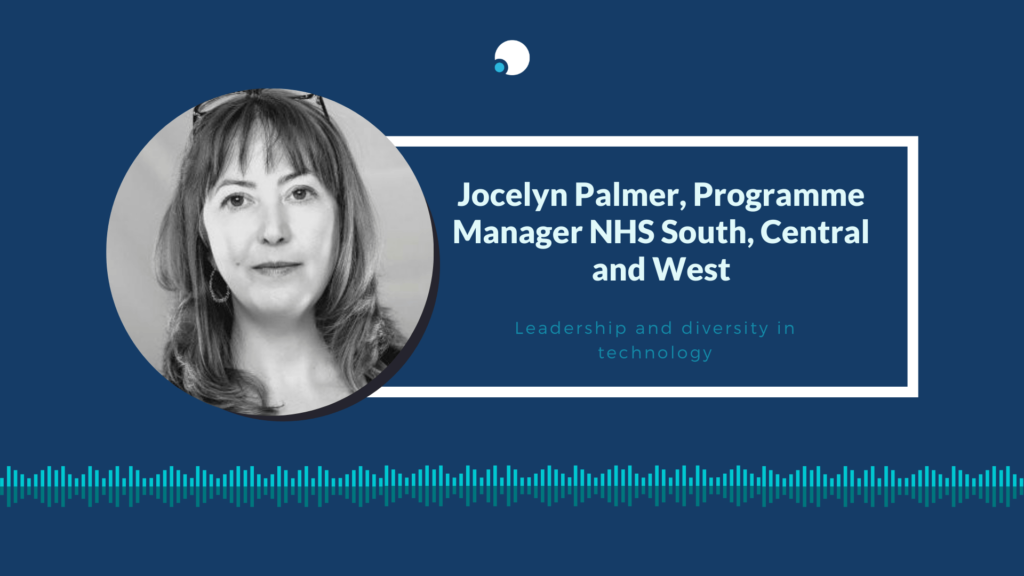
We spoke to Jocelyn Palmer, Programme Manager NHS South, Central and West to discuss the role of the Programme Manager, Jocelyn’s path to Programme Manager and the importance of taking control of your own situation.
Jocelyn’s story is part of a series of articles highlighting the careers of female tech leaders within the NHS. We’ve brought together these stories in an effort to prove that the route to leadership is never a straight line.
As programme lead of the ‘Connecting Care’ initiative across Bristol, North Somerset and South Gloucestershire, Jocelyn is leading the digital transformation charge for well over one million patients in the NHS. Jocelyn’s position as a technology leader is indisputable – but it wasn’t always that way.
“I never thought I’d work in technology. It wasn’t my plan.”
Jocelyn, who studied humanities at school and college, found her route into technology after doing an MSc later in life before starting a role as a Systems Analyst.
“I struggled a bit with an office environment. It was totally new to me. The management culture was macho and work was often thrown back at you. It was a baptism of fire, but I learned so much.”
Despite the difficult working culture, this role would connect Jocelyn with her first mentor – a lady who didn’t necessarily take her completely under her wing, but did provide a sounding board for Jocelyn to figure out her own competencies and feelings at this early stage of her career.
“What she made me realise is that you don’t necessarily go into a job automatically knowing everything. It was the general guidance she provided and that really reinforced the power of positive feedback.”
A mentor doesn’t need to be someone who will coach you through the minutiae of the role. They can be just as effective as sounding boards, people who can help keep you on track with guidance and feedback.
The power of positive feedback stayed with Jocelyn as she moved to her next role where she had her first experience of being managed by someone who truly cares.
“It was the first time I’d had a boss who basically said, “I think you’re great”. That was a real learning for me because it really made me appreciate and value positive reinforcement.”
Moving into her next role, Jocelyn joined another telecommunication company. Here, she stepped out of her business analyst comfort zone and into the choppy waters of project management. Jocelyn, now suddenly had to contend with both internal stakeholders and external consultancies.
“Everyone ran rings around me. You know, I didn’t really appreciate the authority that you need to have as a project manager when you are responsible for something. And I was very much probably still in business analyst mode.”
Despite these initial difficulties, Jocelyn enjoyed a long career there – a career that would ultimately help her define who her true, authentic self is by observing the professionals around her.
“We had very highly paid individuals who were funny and nice to have banter with, but they were also quite aggressive in their style. They would think nothing of making somebody cry as a way to get more out of people. And I remember thinking, that’s not me. I can’t do that”
There are formative moments in our careers. Moments that define us. For some, this can be a positive role model, but for others, it can be a negative influence. While some will seek the ‘right path’ others, like Jocelyn, will seek the path that feels right to them, despite external influence.
“And I think I kind of came to the conclusion that there were certain things I had to learn and beef up on. But I ultimately had to be myself.”
Reflecting on her career, Jocelyn spoke heavily about taking control of negative situations as a way of handling imposter syndrome.
“There have been occasions where I’ve felt vulnerable.”
Demonstrating the resilience across her career, Jocelyn has worked in highly technical environments that are, more often than not, dominated by males.
Being resilient, in theory, seems sound – but applying it is another story altogether. Elements of doubt begin to creep in as you climb the career ladder. This doubt is commonly known as Imposter Syndrome and it’s something that adversely affects women.
According to a report by Access Commercial Finance, a survey of over 3000 adults in the UK shows over two-thirds of women (66%) have suffered from imposter syndrome compared to over half of men (56%) within the last 12 months.
For Jocelyn, who recognises doubt as part of human nature, believes it’s less a question of overcoming imposter syndrome and more a question of handling it.
“Confidence and uncertainty can coexist. You can think you’re good at your job but also be conscious of questions. I think I just give myself a good talking to when that happens.”
Now 15 years into her NHS Programme Management career, Jocelyn is on the bleeding edge of business transformation in one of the world’s biggest employers. Jocelyn’s journey, which has been filled with learnings and setbacks, has prepared her for the responsibility she now has driving change for the NHS.
For those looking to take up a project management position, Jocelyn has 2 pieces of advice.
“Firstly, if you need help, you need to find it. Don’t be afraid to seek out a mentor – you’ll be surprised how many people are willing to help. Secondly, always be learning, and always be curious. Make a conscious effort to observe and notice the good things other people do. Look at the ‘experts’, but also ask yourself how you can be true to you.”